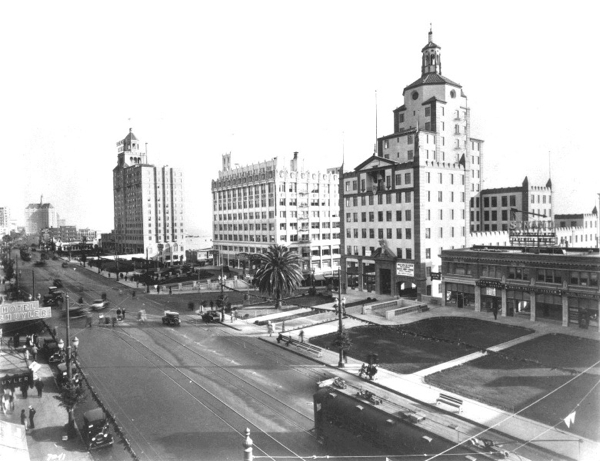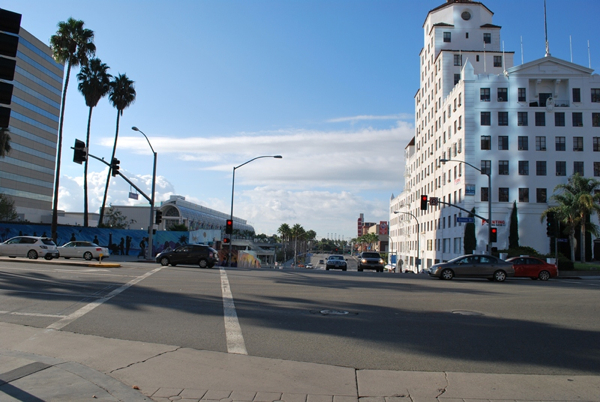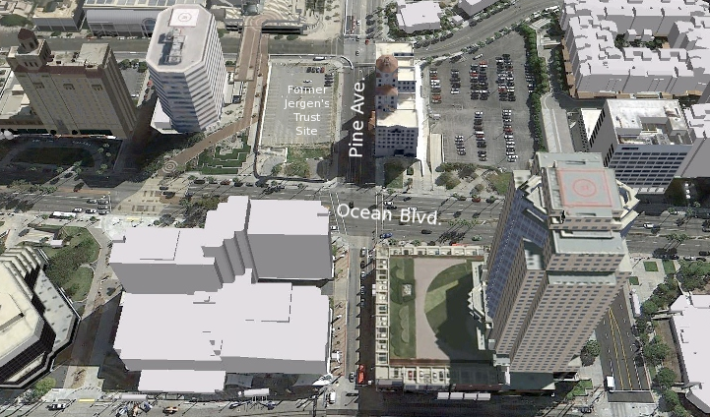Last night, Long Beach Heritage (LBH) and the Long Beach/South Bay chapter of the American Institute of Architects (AIA) hosted their final discussion in a series about the future of Long Beach. And they began as they always do: with a simple albeit important question that is not necessarily geared towards offering a specific solution but rather examining history in order to engage the community on what could be done with important aspects of Long Beach.
In other words, they were addressing a question I had been pondering ever since I saw the success of San Diego's downtown front along the shoreline: how do we re-connect Downtown back to its waterfront?
Similar to their address regarding the possibilities of the Civic Center, this discussion revolved around what used to be one of the city's most vibrant intersections, Ocean and Pine. As Jonathan Glasgow of Interstices pointed out, the intersection is "in many ways our center. It anchors much of the history of our downtown—significant parts of which still exist."
The area is key in regards to connectivity, given that it exists as the clearest crossroad of linkages between historic Pine Avenue, the Pike development, the Aquarium, the Promenade, the Convention Center, and the waterfront—all of which were discussed as essential cogs in the overall revival of Ocean and Pine. The reason for it acting as the future link between these areas is because it once was the link to a bourgeoning downtown scene.

After the Long Beach Land and Water Company became owners of Willmore Town (named after W.E. Willmore, the projector of the colony scheme) and officially named our city Long Beach, development sparked: a hotel was built between Pacific Park and the beach on the bluff, prompting an old horse-driven cart that connected Long Beach with Wilmington to be replaced by a spur of the Southern Pacific Railroad. This caused the town to boom—as Alan Burks of Environ Architecture pointed out, "It was the beginning of Long Beach"—leading to the building of the once-iconic Jergins Trust Building.
This building, sitting on the southeast corner of Pine and Ocean, became an essential development attraction. Then-councilmember Alexander Beck even created a tunnel in 1927—which still exists—that went under Ocean and connected to the building, where businesses existed in the tunnel selling goods while people passed. It was built because, at its peak, Pine & Ocean was seeing some 4,000 cross the intersection per hour on the weekend—a number we could only hope for in a single day in 2012.
Jergins Trust was a key part of fostering what became the wildly popular Pike, a stretch along Seaside Way that even went through JJergins western sister, the Ocean Center Building (which one can view the former Seaside Way's tunnel through the building when facing either the west or east side of the building's façade). In 1985, however, the destruction of the building sparked what many feel was the beginning of the downturn of downtown. Urban legend holds that the city itself cheered on its destruction when, in fact, it fought it: the owner of the building's original request for a demolition permit was denied but, after claiming he simply could not afford a refurbishment, the city then granted the permit.
Matters following this are only more complicated: the $130 million Pike redevelopment became an absolute fiasco, lacking to this day any significant form of foot traffic and being removed from the Downtown Plan due to planning zone requirements; Seaside Way, the once kinetic stretch of passersby, now serves mainly as a utility road for the sprawl of apartment complexes with little to no foot traffic on any level; the former site of the Jergins Trust building has sat, since 1985, empty; the liquidation of the RDA has troubled or flat-out eradicated improvement plans; and the tidelands surrounding the space deeply affect the way in which things can be built.
However, I must commend the panelists in that, though there is a sense of nostalgia regarding pictures where thousands of people gathered near Pine & Ocean, they were optimistic about the possibilities of the future. Ranging from elaborate to simplistic, grandiose to economically efficient, ideas were proposed along the grounds that we need not necessarily start all over (nor can we afford to), but we can use the history behind us to reenact and revive the space at hand.
Melanie Smith of Meléndrez Design Partners displayed a beautiful array of options that reminded us that part of the detraction of Pine & Ocean lies in the fact that it lacks anything on human scale.
"Huge intersection; tiny crosswalk... The streetscape is really devoid of any elements that are of human scale. I believe one of the things [urban designers] are seeing here in Long Beach as well as Los Angeles is the re-discovery of the human scale," Smith said.
Her general ideas revolved around this concept: using the Terrace Theatre fountain as a space for engaging lighting design, with glowing bean bags and bobbling LED lights; turning the Jergins tunnel into a space for engagement à la 6th at Broadway in DTLA ; turning the disjointed Victory Park into a linearly connected space like Kalakala in Hawaii; and, most awesomely, creating a bike path from the foot of Queen's Way Bridge to the Queen Mary parking lot, then out to Pier J.
Though the conversation has begun, though ideas are being tossed around, we still have a huge road ahead of us. For while I refrain from outright saying I would like the Pike and its current out-of-state developer (who once proposed putting in a Bass Pro Shop... actually in the Pike. Yes, in the Pike because clearly the Long Beach mountain range—Signal Hill?—and rivers and lakes are prime fishing and hunting grounds) to be blown up, that I would love to spend millions bringing the waterfront back to front and center, that I would love for private properties to make Victory Park more cohesive, I will state: we need to up our game—and if the city pays attention, we actually have the talent to do it.







